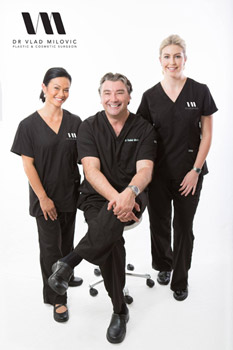Botched Cosmetic Tourism Cases on the Rise

Botched Cosmetic Tourism Cases on the Rise
Australian Society of Plastic Surgeons (ASPS) is strongly advising all Australians to think twice before travelling overseas for cosmetic surgery with a new survey showing the number of Australians returning home with complications is on the rise.
The survey of plastic surgeons has revealed that over half of those conducting cosmetic tourism revisions are seeing more patients requiring assistance in the last 12 months compared to the previous year. In fact, the average rise of cases for these surgeons is a staggering 38 per cent.
The most common kind of surgery conducted overseas requiring corrective treatment was breast surgery (representing 68 per cent of all revision procedures), followed by facial surgery (15 per cent), abdomen revisions (8 per cent), body contouring (5 per cent) and ear revisions (0.5 per cent).
ASPS President Associate Professor Rodney Cooter warns that cosmetic surgery is no different to any other kind of surgery in that it carries serious risk and should be carefully considered. 'Cosmetic surgery is no holiday. Cosmetic surgery packages sold as holidays downplay the importance of the post-operative period. Any kind of major surgery, cosmetic or otherwise, requires a high level of post-operative care. That means rest and healing time to reduce the risk of complications. It's not about sunbathing, drinking cocktails, swimming and snorkelling before jetting home," explains Associate Professor Cooter.
Some of the countries to which Australians commonly travel for cosmetic surgery include Thailand, Malaysia and South America. 'Some of the surgeons operating in these countries are highly skilled professionals. It is important that we make that point. We are not saying that anyone who travels to another country for a procedure is making a mistake. What we are saying is that post-operative care and monitoring is an important part of any surgery. Ask yourself what follow-up care will I get back in Australia after my operation? Who will help me if something goes wrong?" says Associate Professor Cooter.
Highlighting the dangers associated with cosmetic tourism, the survey found that:
72 per cent of plastic surgeons conducting revisions on cosmetic tourism patients have had cases they were unable to completely correct
Almost half say they have seen cases that would have been life threatening without corrective treatment
62 per cent have seen cases which have involved permanent disfigurement despite the surgeon's best efforts because some complications can result in irreversible damage
A similar number have seen cases where the patient has been severely psychologically impacted as a result of their experience.
'Our plastic surgeons see the damage that can result when post-operative care has not been adequate. Infections are the most common complications including unsightly scars, hematomas and unsatisfactory results. For example, one of our surgeons recently treated a facelift patient who was left permanently disfigured after a procedure in Bangkok through skin loss following a complication," added Associate Professor Cooter.
'People often tell us that cost is the main reason for choosing to travel overseas for cosmetic surgery, but if there are complications and revisions are needed, that initial cost can blow-out," says Associate Professor Cooter
The findings show the average cost of cosmetic tourism revision treatment to the patient is an additional $5,754. In addition the average recovery time was found to be two weeks or more which can mean more time off work for those who are employed and potentially loss of earnings.
The increasing number of cosmetic tourism patients requiring revision may also be placing an extra burden on Australia's public health system with 31 per cent of all cosmetic tourism revisions in the last 12 months being conducted in public hospitals.
Associate Professor Cooter recommends the following checklist for those planning overseas surgery:
Is your surgeon a member of the International Society of Aesthetic Plastic Surgery? This at least means they have some form of recognised qualification.
Have you got the right information and had enough time to give informed consent? Two weeks between appointments?
•Are the medical standards of care and quality control requirements at least as good as those in Australia?
Do you know whether or not devices and products used in overseas hospitals meet Australian standards? An implant used in Australia must meet strict standards of safety and effectiveness, a process regulated by the TGA. Other countries may not have similar regulations.
Check out the person promoting the surgery. Are they medically trained? Do they accept any liability or provide any help if problems arise or are they simply a -travel agent' or -broker'?
Dr Milovic advises doing your homework and checking the recommended doctors and facilities. Don't be dazzled by the marketing hype of the cosmetic tour operators.
Members of ASPS are fully trained and qualified in plastic surgery, operate only in accredited surgical facilities, adhere to a strict code of ethics, and regularly attend continuing medical education courses.
MORE
- Chiropractic Myths & Truths
- Gerard Fogarty Arthritis and Knee Replacement...
- Kym Ellery The ELLERY Eyewear Collection Interview
- Dr Ross Walker The Real Modern Killers Interview
- Shelly Horton Hay Fever Help Interview
- Sebastian VanVeenendaal Royal Rehab's Beach...
- Abigail Koch Family Private Health Insurance...
- Monique Cashion Organic Awareness Month Interview
- Dr Bill Harris Omega-3s Interview
- The Top Ten Health Myths Busted
- Professor Bolin IBD Management a Life-Long...
- Anthia Koullouros Best Cold and Flu Defence...
- Leprosy in NSW
- Julie-Anne Mitchell Go Red for Women Healthy...
- Insight into Chronic Disease Hospitalisations...
- Jeff Chan Mobile Phone Allergies Interview
- How to Conquer Bad Winter Health Habits
- Bad Cholesterol Behind Cancer Spreading In Body
- New Screening Test Recommended To Help Prevent...
- Support For The Rural Nurse Workforce A...
- Kathy Nielsen Ovarian Cancer Australia National...



